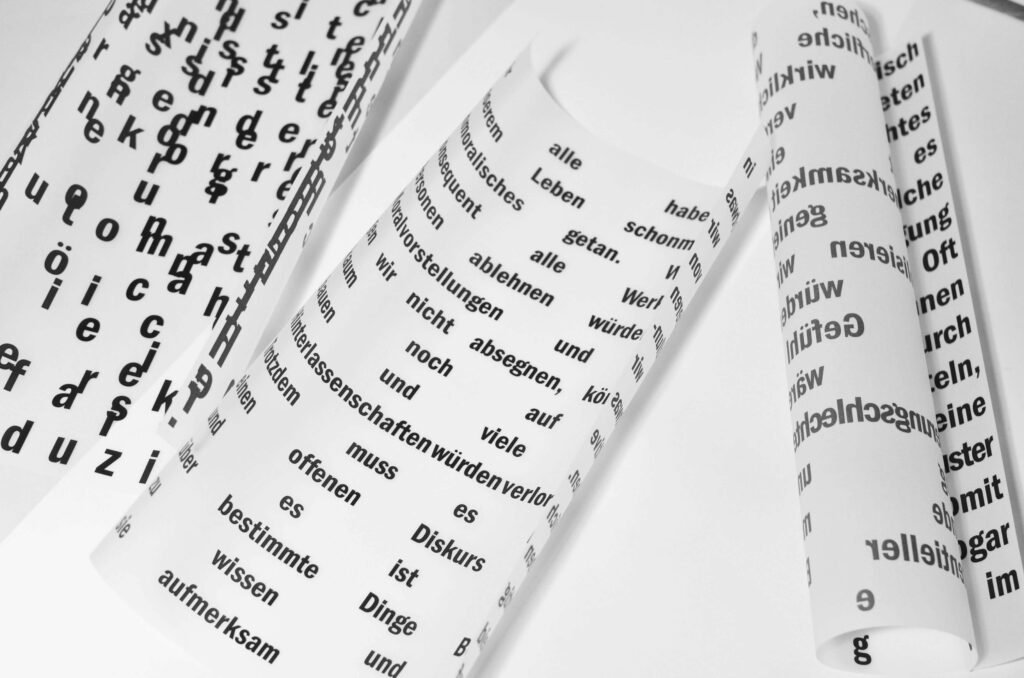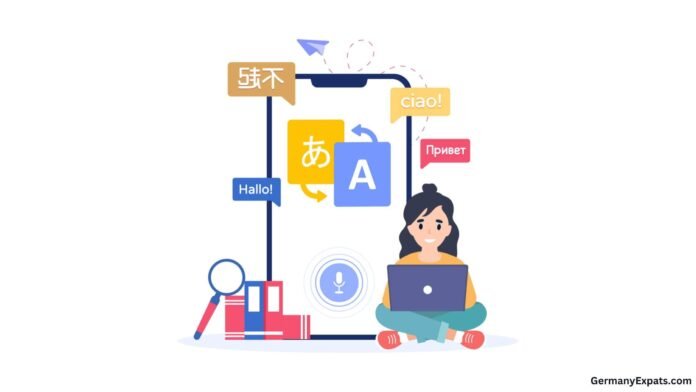Sprachkenntnisse sind auf dem heutigen globalen Arbeitsmarkt von unschätzbarem Wert. Ein Visum für einen Deutschkurs bietet eine einzigartige Möglichkeit, intensiv Deutsch zu lernen und gleichzeitig in die Kultur des Landes einzutauchen. Diese Erfahrung fördert die persönliche Entwicklung und verbessert die Karrierechancen in verschiedenen Bereichen erheblich.
Was ist ein Sprachkursvisum?
A Sprachkurs-Visum ist ein spezielles Visum, das von den deutschen Behörden für Nicht-EU-Bürger ausgestellt wird, die in Deutschland Deutsch lernen möchten. Dieses Visum ist nicht für ein Universitätsstudium gedacht, sondern ausschließlich für intensive Sprachlernprogramme, die von akkreditierten Institutionen angeboten werden. Im Gegensatz zu einem Studentenvisum, A Sprachkurs-Visum berechtigt Sie nicht automatisch dazu, in Deutschland zu arbeiten, es können jedoch begrenzte Ausnahmen gelten.
Definition und Zweck des Visums
Der Visum für Deutschkurse ist ein nationales Visum ausgestellt für Nicht-EU-Bürger, die an einer Intensivkurs Deutsch in Deutschland. Es ist nicht ist für einen langfristigen Aufenthalt gedacht, bietet aber die Möglichkeit, in die Sprache und Kultur eintauchen.
Das Visum ist für folgende Ziele von Vorteil:
- Erweitern Karriereaussichten in Deutschland oder anderen deutschsprachigen Ländern.
- Treffen Sprachkenntnisse für deutsche Universitäten.
- Bereiten Sie sich auf Beschäftigungsmöglichkeiten in Bereichen vor, in denen Deutschkenntnisse sind unerlässlich (Gesundheitspflege, IT, Ingenieurwesen, Wirtschaft).
Dauer und Gültigkeit des Visums
Der Das Visum ist für die Dauer des gebuchten Sprachkurses gültig, mit einem maximale Gültigkeit von 12 MonatenDas erste Visum wird in der Regel ausgestellt für 3 bis 6 Monate und kann erweitert Zu ein Jahr wenn der Sprachkurs fortgesetzt wird. Im Gegensatz zu Studentenvisa, Dieses Visum erlaubt keine Umwandlung in andere Visatypen (z. B. Studenten- oder Arbeitssuchendenvisum). Ein neuer Antrag muss von Ihrem Heimatland aus gestellt werden.
Unterschiede zwischen einem Sprachkursvisum und anderen Visaarten
| Visa-Typ | Zweck | Gültigkeit | Arbeitserlaubnis | Konvertierung erlaubt? |
|---|---|---|---|---|
| Sprachkurs-Visum | Intensives Deutschlernen | Bis zu 12 Monate | Keine Arbeit erlaubt (Ausnahmen können gelten) | NEIN |
| Studentenvisum | Einschreibung in einen Studiengang | Variiert (bis zur Programmdauer) | Erlaubt (120 ganze oder 240 halbe Tage pro Jahr) | Ja (kann für die Arbeit nach dem Abschluss verlängert werden) |
| Arbeitsuchende Visum | Jobsuche in Deutschland | 6 Monate | Keine Arbeit erlaubt | Ja (wenn ein Job gefunden wird) |
| Arbeitsvisum | Beschäftigung in Deutschland | Basierend auf Arbeitsvertrag | Vollzeitarbeit erlaubt | Basierend auf dem Arbeitsvertrag |
Eignungskriterien
Um ein Visum für einen Deutschkurs zu beantragen, müssen die Antragsteller mehrere Zulassungsvoraussetzungen erfüllen.Dazu gehören Altersbeschränkungen, Bildungshintergrund, finanzielle Stabilität und Krankenversicherungsschutz.
A. Altersanforderungen für Bewerber: Es gibt keine feste Altersgrenze für die Bewerbung, die meisten Bewerber sind jedoch 18 Jahre oder älter. Minderjährige können das Programm mit Zustimmung der Eltern nutzen und müssen zusätzliche Unterlagen vorlegen.
B. Bildungshintergrund und SprachkenntnisseFür die Beantragung eines Sprachkursvisums ist keine formale Ausbildung erforderlich. Der Antragsteller benötigt keine Deutschkenntnisse (diese können für Kurse auf A1-Niveau verwendet werden). Der Kurs muss jedoch intensiv sein und mindestens 18 Unterrichtsstunden pro Woche umfassen. Manche Visabeamte bevorzugen Antragsteller mit mindestens Grundkenntnissen (Niveau A1), um die Teilnahme am Programm sicherzustellen.
C. Finanzielle Voraussetzungen und Finanzierungsnachweis: Bewerber müssen ihre finanzielle Stabilität nachweisen, indem sie nachweisen, dass sie ihren Lebensunterhalt während ihres Aufenthalts bestreiten können. Der erforderliche Betrag beträgt 11.208 € pro Jahr (Stand 2024).
Als Nachweis für die finanziellen Mittel gelten ein Sperrkonto mit einem Mindesteinzahlungsbetrag von 11.208 €, eine Verpflichtungserklärung eines Förderers in Deutschland und gegebenenfalls einen Stipendiennachweis. Ohne ausreichende Mittel kann die Visumantrag kann abgelehnt werden.
D. Krankenversicherungsvoraussetzungen: Für die Visumserteilung ist eine Krankenversicherung erforderlich. Antragsteller müssen eine Reise- oder Krankenversicherung für den gesamten Aufenthalt in Deutschland nachweisen. Die Versicherung muss den deutschen Standards entsprechen und mindestens Folgendes abdecken: 30.000 € medizinische Kosten.
Akzeptierte Versicherungsoptionen: Private Krankenversicherung (für Kurzaufenthalte). Gesetzliche Krankenversicherung (bei geplanter Verlängerung des Aufenthalts für Studienzwecke).
Auswahl einer akkreditierten Sprachschule

Die Auswahl einer anerkannten Sprachschule ist für einen erfolgreichen Visumsantrag unerlässlich. Die deutschen Behörden verlangen, dass die Einrichtung bestimmte Standards erfüllt, um eine qualitativ hochwertige Ausbildung und die Einhaltung der Visabestimmungen zu gewährleisten.
Bedeutung der Auswahl einer akkreditierten Institution
Die Wahl einer akkreditierten Sprachschule erhöht die Chancen auf eine Visumsgenehmigung. Der Visumsantrag kann abgelehnt werden, wenn die Einrichtung nicht offiziell anerkannt ist. Akkreditierte Schulen folgen staatlich anerkannten Standards für Intensivkurse und gewährleisten so ein strukturiertes und qualitativ hochwertiges Lernerlebnis. Die Einschreibung an einer anerkannten Einrichtung verbessert zudem Ihre beruflichen und akademischen Aussichten, da viele Arbeitgeber und Universitäten nur Sprachzertifikate von akkreditierten Schulen akzeptieren.
Kriterien für die Akkreditierung und Anerkennung durch die deutsche Regierung
Um Anspruch auf eine Sprachkurs-VisumDie Einrichtung muss Intensivkurse mit mindestens 18 Unterrichtsstunden pro Woche anbieten. Sie muss in Deutschland offiziell als Bildungseinrichtung registriert sein und strukturierte Programme anbieten, die sich am Gemeinsamen Europäischen Referenzrahmen für Sprachen (GER) orientieren. Die Schule muss außerdem Zertifikate ausstellen, die den GER-Niveaus (A1–C1) entsprechen und von deutschen Visumsbehörden wie der Bundesagentur für Arbeit oder den örtlichen Ausländerbehörden anerkannt werden.
Mehrere etablierte und akkreditierte Deutsch-Sprachschulen, darunter das Goethe-Institut, die Berlitz Sprachschulen, das Humboldt-Institut und das DID Deutsch-Institut, erfüllen diese Kriterien.
Ressourcen zur Suche nach akkreditierten Sprachschulen
Bewerber können anerkannte Sprachschulen über offizielle Plattformen finden. Die Goethe-Institut Website bietet eine Liste international anerkannter Sprachzentren in ganz Deutschland. Die Bundesamt für Migration und Flüchtlinge (BAMF) und die Deutscher Akademischer Austauschdienst (DAAD) bieten Datenbanken mit staatlich anerkannten Sprachschulen an. Auch universitäre Sprachzentren bieten intensive Vorbereitungskurse an, die die Visabestimmungen erfüllen.
Zur Überprüfung der Akkreditierung können sich Bewerber an den Verband Deutscher Sprachschulen (FDSV) wenden. Dieser stellt eine Liste von Einrichtungen bereit, die den Branchenstandards entsprechen. Testzentren für TestDaF und TELC bieten außerdem von Universitäten und Arbeitgebern anerkannte Sprachprogramme an.
Überblick über den Bewerbungsprozess

Bewerbung für eine Visum für Deutschkurse Der Prozess umfasst mehrere Schritte, darunter die Sicherung der Zulassung, das Zusammenstellen der erforderlichen Dokumente und die Einreichung des Antrags bei der deutschen Botschaft oder dem deutschen Konsulat. Der Prozess kann mehrere Wochen dauern, daher ist eine frühzeitige Vorbereitung unerlässlich.
Schritt-für-Schritt-Anleitung zum Bewerbungsprozess
1. Wählen Sie eine akkreditierte Sprachschule: Der erste Schritt besteht darin, sich für einen Intensivkurs Deutsch anzumelden, der Visabestimmungen (mindestens 18 Stunden pro Woche). Die Schule muss einen offiziellen Zulassungsbescheid vorlegen, der die Einschreibung und die Kursdauer bestätigt.
Finden Sie einen Deutsch Sprachschule die Vollzeitstudiengänge anbietet. Sie benötigen einen Zulassungsbescheid, um Ihre VisumantragZu den anerkannten Institutionen gehören unter anderem:
- Goethe-Institut (Website des Goethe-Instituts)
- Berlitz Deutschland (Berlitz Website)
- Sprachcaffe (Sprachcaffe Website)
2. Sammeln Sie die erforderlichen Dokumente: Antragsteller müssen alle erforderlichen Unterlagen zusammenstellen, darunter einen Finanzierungsnachweis, eine Krankenversicherung und Angaben zur Unterkunft.
3. Vereinbaren Sie einen Termin bei der Deutschen Botschaft oder dem Deutschen Konsulat: Visaanträge müssen bei der deutschen Auslandsvertretung im Heimatland des Antragstellers gestellt werden. Gegebenenfalls ist eine Terminvereinbarung erforderlich. mehrere Wochen im Voraus.
4. Reichen Sie den Visumantrag ein und nehmen Sie am Interview teil: Im Vorstellungsgespräch müssen die Bewerber ihre Unterlagen vorlegen und Fragen zu ihren Studienplänen, ihrer finanziellen Situation und ihren Absichten nach dem Studium beantworten.
5. Warten auf Bearbeitung und Entscheidung: Die Botschaft prüft den Antrag und kann zusätzliche Unterlagen anfordern. Bei Genehmigung erhalten die Antragsteller eine nationales Visum die Einreise nach Deutschland zu ermöglichen.
6. Anmeldung bei der Ankunft in Deutschland: Nach der Ankunft in Deutschland müssen die Antragsteller seinen Wohnsitz beim örtlichen Bürgeramt anmelden und verlängern Sie ggf. Ihr Visum bei der Ausländerbehörde.
Erforderliche Unterlagen für den Visumsantrag:
Für einen vollständigen Visumsantrag müssen Antragsteller folgende Unterlagen vorlegen:
- Ausgefülltes Visumantragsformular
- Gültiger Reisepass (mit mindestens zwei leeren Seiten)
- Aktuelle biometrische Passfotos
- Zulassungsbescheid einer anerkannten Sprachschule
- Nachweis über finanzielle Mittel (Sperrkonto mit mindestens 11.208 € oder Verpflichtungserklärung)
- Nachweis einer Krankenversicherung für den gesamten Aufenthalt (Mindestdeckungssumme 30.000 €)
- Unterkunftsnachweis (Mietvertrag oder Bestätigung eines Gastgebers)
- Zahlung der Visagebühr (normalerweise 75 €)
- Motivationsschreiben den Zweck des Deutschstudiums und die Pläne erklären
- Flugplan (falls von der Botschaft verlangt)
Zeitplan für die Bearbeitung des Visumantrags
Die Bearbeitungszeit für ein Deutschkursvisum variiert je nach Botschaft und Heimatland des Antragstellers. Sie dauert vier bis zwölf Wochen für die Prüfung des Antrags. Einige Faktoren, die die Bearbeitungszeit beeinflussen, sind:
- Das Antragsvolumen bei der Botschaft
- Die Vollständigkeit der Bewerbung
- Ob zusätzliche Dokumente oder Hintergrundprüfungen erforderlich sind
Um Verzögerungen zu vermeiden, wird eine Bewerbung mindestens drei Monate im Voraus empfohlen.
Finanzielle Überlegungen
Finanzielle Voraussetzungen sind entscheidend bei der Bewerbung um Visum für Deutschkurse. Um die Genehmigung des Visums zu erhalten, müssen die Antragsteller Studiengebühren, Lebenshaltungskosten und einen finanziellen Einkommensnachweis einplanen.
Studiengebühren für Sprachkurse
Die Kosten eines Sprachkurses hängen von der Institution, der Kursdauer und dem Standort in Deutschland ab. Im Durchschnitt liegen die Studiengebühren für Intensivkurse Deutsch zwischen 200 bis 600 € pro Monat. Etabliertere Institutionen wie Goethe-Institut oder universitäre Sprachenzentren, kann Gebühren erheben 1.000 € bis 2.500 € für dreimonatige Programme. Private Sprachschulen können je nach Klassengröße und Unterrichtsmethoden günstigere oder teurere Optionen anbieten. Vollzeitkurse müssen mindestens 18 Stunden pro Woche um sich für das Visum zu qualifizieren.
Lebenshaltungskosten in Deutschland

Bewerber müssen nachweisen, dass sie ihren Lebensunterhalt während des Studiums bestreiten können. Geschätzte monatliche Lebenshaltungskosten in Deutschland Die Studiengebühren betragen ca. 934 € und decken Miete, Verpflegung, Transport, Krankenversicherung und persönliche Ausgaben ab. Der Gesamtbetrag für ein Jahr beträgt 11.208 € und entspricht dem Betrag, der für die Visumserteilung auf einem Sperrkonto hinterlegt werden muss.
Die Lebenshaltungskosten variieren je nach Stadt. In Berlin, Hamburg oder München sind die Mieten höher und liegen oft über 700 Euro pro Monat für eine private Wohnung. In kleineren Städten wie Leipzig oder Heidelberg kann die Miete zwischen 300 und 500 Euro liegen. Öffentliche Verkehrsmittel kosten zwischen 49 und Die Kosten für die Krankenversicherung betragen 100 € pro Monat, die Kosten für die Krankenversicherung betragen je nach Anbieter 30 € bis 120 € pro Monat.
Für den Visumsantrag erforderliche Finanzdokumente
Bewerber müssen nachweisen, dass sie Studiengebühren und Lebenshaltungskosten durch finanzielle Unterlagen decken können. Der am häufigsten akzeptierte Nachweis ist ein Sperrkonto mit mindestens €11,208 hinterlegt. Einige Banken, wie zum Beispiel Fintiba, Expatrio und die Deutsche Bank, bieten Sperrkonten speziell für Visumantragsteller an.
Zu den weiteren Möglichkeiten des finanziellen Nachweises gehören formelle Verpflichtungserklärung von einem in Deutschland lebenden Förderer, der die Kosten übernimmt. Stipendien müssen gegebenenfalls durch eine offizielle Bescheinigung der Förderinstitution belegt werden.
Kann man ein Sprachkursvisum verlängern?
Ein Sprachkursvisum wird in der Regel für die Dauer Ihres Sprachkurses (bis zu einem Jahr) ausgestellt. Wenn Sie es verlängern möchten, müssen Sie triftige Gründe nachweisen, z. B. die Anmeldung zu einem anderen Sprachkurs oder den Wechsel in eine Studentenvisum für ein UniversitätsstudiumDie Gewährung einer Verlängerung liegt im Ermessen der örtlichen Ausländerbehörde.
Können Sie mit einem Sprachkursvisum arbeiten?
Ein Sprachkursvisum berechtigt in der Regel nicht zur Arbeit. Unter bestimmten Voraussetzungen kann Ihnen jedoch eine begrenzte Anzahl von Stunden pro Woche gestattet werden. Erkundigen Sie sich bei Ihrer örtlichen Ausländerbehörde nach den aktuellen Bestimmungen.
Abschluss
Ein Sprachkursvisum bietet Nicht-EU-Bürgern eine hervorragende Möglichkeit, in die deutsche Sprache und Kultur einzutauchen. Der Antragsprozess mag komplex erscheinen, aber mit sorgfältiger Planung und den richtigen Unterlagen erhöhen Sie Ihre Chancen auf eine Genehmigung. Ob Sie Ihre Sprachkenntnisse aus beruflichen oder akademischen Gründen verbessern möchten – dieses Visum bietet Ihnen einen strukturierten Weg, Ihr Ziel in Deutschland zu erreichen.
FAQs
1. Wie lange dauert es, ein Sprachkursvisum zu erhalten?
Die Bearbeitungszeiten variieren je nach Ihrem Wohnsitzland, aber Eine Entscheidung wird in der Regel in 4 bis 12 Wochen.
2. Kann ich in Deutschland von einem Sprachkursvisum auf ein Studentenvisum umsteigen?
Ja, wenn Sie an einer deutschen Universität eine Zulassung erhalten, können Sie sich für ein Studentenvisum in Deutschland. Sie müssen jedoch die Förderkriterien der Universität erfüllen und einen Nachweis über finanzielle Mittel erbringen.
3. Was passiert, wenn mein Visumsantrag abgelehnt wird?
Wenn Ihr Sprachkurs-Visum Wird Ihr Antrag abgelehnt, erhalten Sie einen Ablehnungsbescheid mit Begründung. Sie können gegen die Entscheidung Einspruch einlegen oder sich erneut bewerben und zusätzliche Unterlagen zur Untermauerung Ihrer Argumente einreichen.

